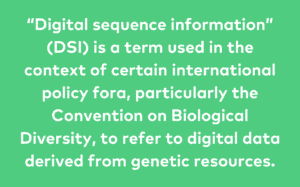Digital Sequence Information: Access, Innovation, and Benefit-Sharing
16 June 2022Open access to “digital sequence information,” or DSI, can help drive innovation to cure diseases, develop crops resistant to climate change, protect global biodiversity, and more. However, open access can also lead to the exploitation of biological resources – particularly in vulnerable countries and communities. This spring, Meridian convened stakeholders at The Rockefeller Foundation Bellagio Center to discuss this contentious issue in preparation for upcoming international negotiations.
What is DSI, and why does it matter?
 Before the 1990s, genetic resources were seen as the common heritage of humankind and were available without restriction. However, such unrestricted access raised concerns about sovereignty over genetic resources and led to issues of equity and fairness. Developed countries had greater technological capacity, and freely utilized the biological resources of developing countries rich in biodiversity.
Before the 1990s, genetic resources were seen as the common heritage of humankind and were available without restriction. However, such unrestricted access raised concerns about sovereignty over genetic resources and led to issues of equity and fairness. Developed countries had greater technological capacity, and freely utilized the biological resources of developing countries rich in biodiversity.
In 1993, 147 countries ratified the Convention on Biological Diversity (the CBD), which brought genetic resources under the jurisdiction and sovereignty of national governments. However, there was a broad recognition that agricultural genetic resources – which cross international boundaries – required different solutions. As a result, the International Treaty on Plant and Genetic Resources for Food and Agriculture (the Treaty) was signed in 2001. The CBD and the Treaty established an international multilateral system to facilitate access to and regulate use of plant genetic resources. These agreements also established a “benefit-sharing” system for the commercial use of physical resources. While genetic resources are not patentable, the inventions based on them may be. As a result, the Treaty obliges users to provide monetary payments for the access and use of physical genetic samples taken from a particular territory or nation.
Since these agreements were drafted, however, technology has drastically changed: today, genetic material can be digitally sequenced, stored in databases, and shared with the click of a button. As drafted, current international regimes that tie access and benefit-sharing obligations to the use of physical genetic resources do not address the rise of digital genetic resources. This allows users of DSI to bypass established international treaties and not share benefits derived from access.
A New International System
Since 2016, international negotiations have begun addressing the challenges that arise now that research methods can substitute use of physical biological material with DSI.
At present – and except where national laws dictate otherwise – it is possible to access and use DSI from plants that are subject to international treaties without triggering benefit-sharing obligations. This lack of benefit-sharing is unsatisfactory to many and has become deeply controversial.
While support for access and benefit sharing is generally high, there are concerns it may limit or eliminate open access to DSI, which fuels research and innovation. For example, DSI was used to design the diagnostic kits and vaccines that saved millions of lives during the COVID-19 pandemic. It has also played an important role in taxonomy, identifying and mitigating risks to threatened species, tracking illegal trade, identifying the geographical origin of products, and planning conservation management.
In the absence of international consensus on DSI, it is likely that more and more countries will create their own regulations on access and benefit-sharing – generating a complex landscape for researchers and private sector actors to navigate, and potentially limiting the positive impacts DSI could have. Furthermore, too many differentiated national rules could lead users to seek out DSI from countries with the least restrictive arrangements leading to a “race to the bottom” and precluding many from benefit sharing.
Creating A Space for Open Discussion
It was in this context that Meridian convened a three-day meeting of relevant stakeholders from different sectors and geographies to explore options on regulation, access, and benefit-sharing. The impasse and complexities around DSI reinforce the need for a shared understanding of the implications of DSI for access and benefit-sharing. Our convening provided space for building this understanding in iterative, open-ended conversations. Discussions focused on how to move forward in a way that accounted for the underlying interests of the many parties involved in the formal negotiations.
The greatest value in these three days is that here, we had the possibility to test our own ideas in an informal setting. As negotiators in formal spaces, we sometimes do not have the opportunity to say our own thoughts, and we have to defend to the end our country’s position. Here, we have openly talked with different stakeholders and experts, without judgement or compromise. It helps us come back to our own countries.”
– Participant at DSI convening
There was productive exploration of a multilateral system with a bilateral component. This path represents a significant opportunity if important details – especially how a global benefit-sharing fund would be established and governed, and the degree of bilateralism within a broadly multilateral system – can be agreed upon. Informal, generative conversations such as these help DSI stakeholders move into international negotiations on better terms, unlocking the benefits of DSI while ensuring countries and communities are supported in their stewardship of the world’s biodiversity.